Campus News
Slug spirit shines bright on commencement weekend
Grads celebrated family and friends and cherished the moment during Commencement Weekend 2019 at UC Santa Cruz. Nearly 2,700 undergraduates had applied to participate in college commencement ceremonies.
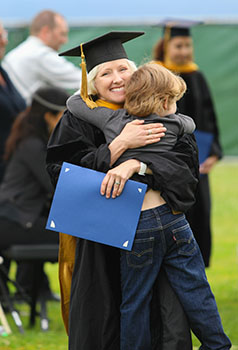
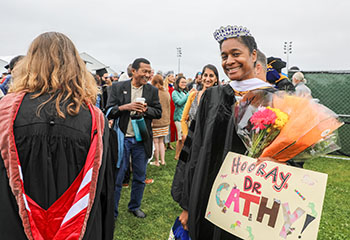
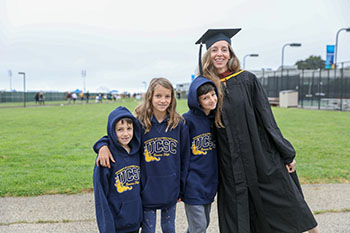



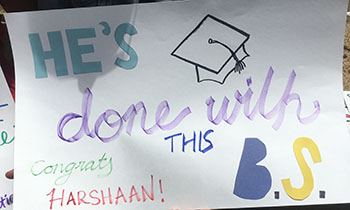


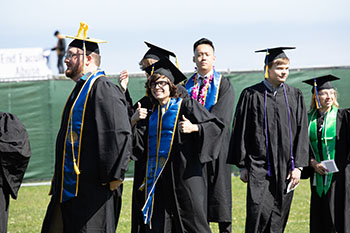
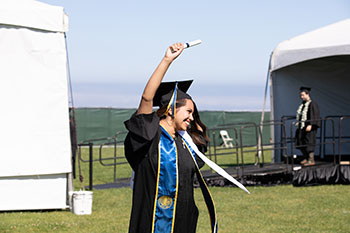
UC Santa Cruz commencement weekend was a time for graduates to honor those who helped them along the way—the mentors, friends, colleagues, extended family, parents, and children who cheered them on and guided their path.
Ceremonies for UC Santa Cruz’s 10 colleges, Graduate Division, and Baskin School of Engineering took place June 14–16.
The celebrations, featuring an array of inspiring speakers, kicked off on Friday morning on the East Field, where approximately 200 graduate students participated in the Graduate Division’s commencement ceremonies.
Many grads took the time to pay tribute. That was certainly the case for Michelle Tija, who walked alongside her professor of molecular and cell biology, Yi Zuo, as she waited to receive her Ph.D. in molecular cell development.
“She has been so supportive, and so patient with me,” Tija said.
In Tija’s work, she set out to understand how molecular mechanisms affect the plasticity of neuronal synapses. As she made her way forward with her research, “all my mentor’s feedback propelled my research forward. She provided the guardrails and the steering, and asked, ‘What is the next step?’”
Clearly the moment was overwhelming for Zuo, too. “It was amazing to see her growth,” Zuo said. “To me, it’s a big sister’s feeling, or a mother’s feeling, to see how she grew. It’s so exciting, but a little bit sad, too.”
Proud recipients of advanced degrees also enjoyed the uninhibited displays of support from their loved ones. Susan Citrak, earning a Ph.D. in inorganic materials chemistry, was up on the stage, waiting to get her degree, when she heard her young son shouting “Go Mom!” from the audience. When she walked down the stairs after getting her degree, he ran up and gave her a hug.
“How lucky I am to have a son who is such a cheerleader for me!” she remarked later on.
Others honored the cultures and the transformative moments that built, nurtured, and sustained them on the way. Kara Hisatake wore a traditional, handwoven lei paying tribute to her ancestry. Her research focused on Hawai’i Creole English, or what is more commonly known as Pidgin in Hawai’i, in literature, comedy/performance, and the law.
Out on East Field, the most popular seating area was beneath the shelter of the white tents, as usual. But on Friday morning, the celebrating families were not using the tent to escape from the usually blistering graduation-day sun. Instead, they were sheltering from the blowing fog and occasional rain spatters. By afternoon, the gloom gave way to sunshine so intense that revelers repurposed their umbrellas as parasols.
The celebration seemed to pass in a flash for the graduates, especially those who had labored for years in pursuit of their advanced degrees.
“It’s pretty amazing to see six years of work condensed down to this!” gushed ecology and evolutionary biology Ph.D. recipient Sarah Kienle.
Then again, graduation day was not the first time that Kienle had to condense six years of intensive work into a fleeting and life-changing moment. Earlier in the year, Kienle won the top prize at UC Santa Cruz’s Grad Slam competition for a lightning-fast, humor-accented talk about sexual dimorphism in elephant seals and how the dramatically different appearances of the males and females corresponds to their feeding and hunting strategies.
Farewell to a chancellor
The Graduate Division ceremony was emotional for a different reason for the keynote speaker, UC Santa Cruz Chancellor George Blumenthal, who took the occasion to give thanks and farewell; this was his last commencement as the top UC Santa Cruz administrator.
He combined some surprising words of wisdom and advice with disarming humor. At one point he assured the sleep-deprived graduate students that they would soon be able to catch up on all their lost slumbers, “hopefully after I finish my remarks.”
Blumenthal recalled the moment, soon after his appointment as chancellor, when UC Santa Cruz alumnus and Silicon Valley entrepreneur Gordon Ringold gave him two books: Curious George Gets a Medal and Curious George Gets a Job, about a precocious monkey. Blumenthal revealed his affinity with the famous children’s book character who often got himself in trouble, only to make sure everything turned out just fine in the end. Blumenthal said that curious risk-taking spirit sustained him during his influential studies on dark matter.
He also urged grad students to put their UC Santa Cruz work to the best use, communicating their work so clearly that anyone, from all walks of life, could understand and benefit from it. He referred to a question he often posed to Ph.D. candidates defending their dissertations: “Explain to me how you’ve advanced human knowledge.”
“Will we get through this?”
The campus was bustling, and for good reason. More than 5,200 UC Santa Cruz students are earning undergraduate and graduate degrees for work completed during the 2018–19 academic year. Every one of those graduates had a story about perseverance and hard work, whether they were in it for a six-year marathon or a one-year sprint.
Drishti Bhardwaj, who earned an M.S. in applied economics and finance, is about to finish up a program that lasted only a year, but it was extremely intense; she had to fulfill the same requirements she would have faced in a two-year course.
“Toward the end of the course, there was that feeling of, ‘Will we get through this?’” she said.
Though she was excited to take part in the ceremony, the hard work is not quite over just yet; Bhardwaj still has to take her majors exam.
“But I’ve done all the work,’’ she added with a smile. “I think it’ll be fine.”
A total of 4,488 undergraduate students are candidates for bachelor degrees for work completed in the arts, engineering, humanities, physical and biological sciences, and social sciences. Nearly 2,700 undergraduates had applied to participate in college commencement ceremonies.
Those numbers may seem overwhelming, especially when you consider that these newly minted alumni will join a community of more than 100,000 Banana Slugs. But personal interactions brought the ceremonies down to a human scale. Everywhere, friends and family were lining up to ambush those scholars with bear hugs, floral leis, and sunflower bouquets. Parents nervously fussed with their grown-up children’s ties, collars, tassels, and graduation caps. Some waved stick-mounted placards with blown-up color photos of their progeny’s smiling faces.
Paying tribute to nurturing families and future selves
Ysmeralda Diestro (College Nine ‘19, business management/economics with emphasis on accounting) posed for photos with her loved ones and paid tribute to her heritage with the Filipino flag emblazoned on her graduation stole, the garment she draped across her shoulders.
Diestro, a first-generation college student, immigrated to the United States 13 years ago when she was 9. Eleven long years would pass, after her arrival in this country, before she could see her relatives again in the Philippines. In those days before WiFi was omnipresent, she was forced to rely on expensive pre-paid call cards just to catch up with her beloved family. It was lonely and much too quiet in her new home.
“I was used to people yelling, laughing, and cooking,” she said.
But all the while, she knew her family members were rooting for her.
“What really stuck with me was something my grandmother said, that money comes and goes, but education is something no one can ever take away from you. I just feel really blessed, thinking of everything I had to go through, and where I am now,” Diestro said.
Sometimes, graduates also paid tribute to the people they wished to become, as if those older and wiser versions of themselves were looking back and guiding their footsteps.
Victoria Debrito (College Nine ‘19, sociology with minor in education) wore a hand-decorated graduation cap that said, “Teach from the heart, Ms. Victoria.” When asked if she was honoring a teacher from her distant past, Debrito explained that the honoree was her future self. She plans to earn a credential in education and fulfill her dream of being a teacher.